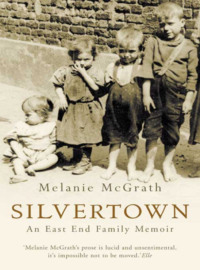
Полная версия
Hopping
When they got home, Joe was sitting in his chair, smoking, and there was a smell of beer in the air.
Where you been? he said.
Round and about, said Franny. It wasn’t my idea.
Well, from now on you’re staying in. Ain’t no place for a gel out there, all sorts going on, Joe said.
Daisy knew he meant a pretty girl. A girl like Daisy went largely unnoticed. He finished his cigarette then reached into his pocket and, pulling out the lining to find nothing hiding inside, he went to his jacket, which was hanging on a peg in the passageway, and, fishing out a coin, he turned to Daisy and said:
Fetch your old dad a half-ounce of tobaccer. Ain’t no one open but old Settle up the road at number seventeen, I seen him selling shag to a docker, so knock on his door. He knows me.
Later, after a tea of leftovers boiled into soup, Joe rolled Settle’s tobacco into newspaper and sat smoking and shaking his head.
I ain’t saying I’m for that Lansbury cove, nor for socialism neither, but I’ll tell you this for free; it ain’t right what’s happening and that’s that.
The strike lasted nine days and the Baldwin government did everything they could to stop it. In the London docks they continued recruiting volunteer militia police, including some pretty disreputable men, and brought in two navy submarines into the Royals to act as generators for the refrigerated warehouses where 750,000 beef and lamb carcasses were going nowhere. On the fifth day, lorries driven by soldiers broke the picket line and on 12 May the Trades Union Congress admitted defeat and called the strike off. Though the action was a failure, it proved to be iron ore to Joe Crommelin’s moral compass. From that day in May 1926 on, he was almost always to be found at evening meetings of one kind or another: trade unions, workers’ education committees, strike committees, fringe meetings and hustings. Joe didn’t talk about these meetings much, though he often brought home pamphlets, which he kept in the locked drawer in the chest into which Elsie had once placed Daisy and Franny when they were babies. Every so often he would unlock the drawer and remove a pile of leaflets, but he never spoke about what became of the leaflets or of his meetings for that matter, and Daisy did not care to quiz him. It was enough for her that for the first time since before the war, Joe Crommelin seemed happy and, for short periods at least, to be able to forget Elsie’s absence. Unionism had given him a cause less painful, less puzzling and certainly less hopeless than his wife.
Конец ознакомительного фрагмента.
Текст предоставлен ООО «ЛитРес».
Прочитайте эту книгу целиком, купив полную легальную версию на ЛитРес.
Безопасно оплатить книгу можно банковской картой Visa, MasterCard, Maestro, со счета мобильного телефона, с платежного терминала, в салоне МТС или Связной, через PayPal, WebMoney, Яндекс.Деньги, QIWI Кошелек, бонусными картами или другим удобным Вам способом.






